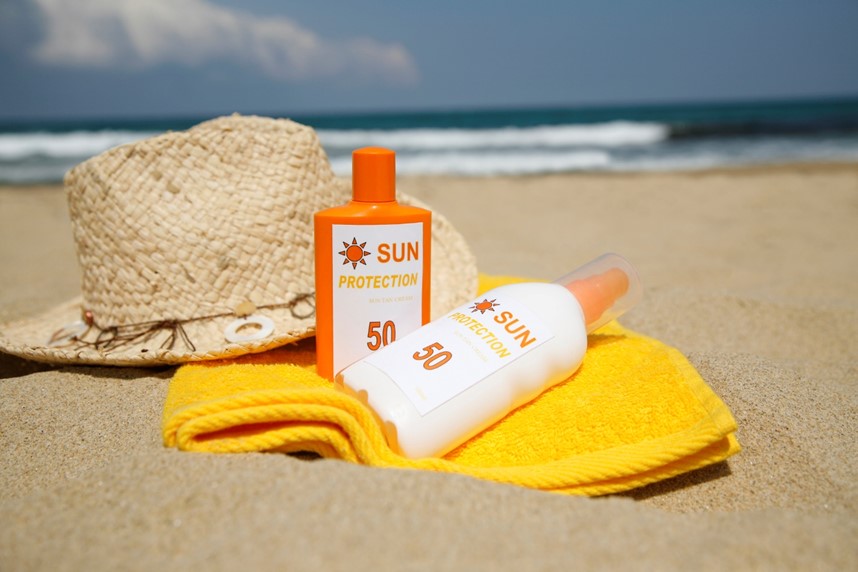Choosing the Best Sunscreen

The Necessity of Sunscreen
You have certainly heard it, because it’s advised everywhere: wear sunscreen every day. No matter the season or the weather, sunscreen is a necessity, protecting the skin from skin cancer and the signs of aging. In fact, aside from staying out of the sun, sunscreen is the very best way to guard against sun damage. Once you are committed to wearing it every day, though, which sunscreen should you choose?
Important Elements to Look for in a Sunscreen
When you choose a sunscreen, you want to make sure you choose one that is effective. Read the label carefully, making sure that it indicates:
- Broad spectrum: This means that the sunscreen protects against both UVA rays and UVB rays. UVB rays cause sunburn, but UVA rays can penetrate glass and will affect the layers of your skin below the surface. It is vital that you choose a sunscreen that blocks both kinds of ultraviolet radiation.
- SPF 30 or higher: SPF 30 or above is recommended by the American Academy of Dermatology. Higher SPF sunscreens tend to be sticky, so you might not want to use them every day, but it is important not to go below 30 SPF.
- Water resistant: Whether or not you are going to be in water, you want water-resistant sunscreen, so that you won’t be able to sweat it off of your skin.
Physical or Chemical Sunscreen
You can choose between physical or chemical sunscreen, depending on what types of active ingredients you want to use. Technically, though, all sunscreen ingredients are chemicals. It’s more accurate to call chemical sunscreen “organic” and refer to physical sunscreen as “inorganic.” Both types absorb UV rays, but physical (inorganic) sunscreen does this by creating a protective barrier on the skin’s surface, while chemical (organic) sunscreen absorbs into the skin and causes a chemical reaction that converts ultraviolet radiation into heat so that it doesn’t harm the skin. The FDA has only approved two inorganic sunscreen ingredients, titanium dioxide and zinc oxide, and to be truly effective, the sunscreen needs to contain a 10 percent concentration of one of these ingredients. Physical sunscreens typically leave a white color on the skin.
Choosing the Right Sunscreen for Your Skin
You can use the same sunscreen on your face that you use for the rest of your body, but most people prefer to choose a formulation for the face that is created for sensitive facial skin. Look for sunscreen designed for your type of skin, whether that’s dry or oily, sensitive, or acne prone. Be careful not to use sunscreen with chemicals like retinol, though, because the combination can irritate your skin.
Applying Sunscreen Correctly
Whether or not you are going to be outside, you should wear sunscreen every day. You can choose between lotion, stick, or spray sunscreen, but lotion offers the most coverage. Stick sunscreens are convenient, but it’s easy to miss a spot while you’re applying them. That makes them better than the face than for full body application. Spray sunscreens are convenient, especially if you’re applying them to children, but they are not a good idea. Much of the sunscreen you spray won’t make it to your skin, even if there is not much of a breeze, so you won’t get enough protection and you will have to apply it more frequently. Worse, spray sunscreens release toxic chemicals and aerosols, and can be a fire hazard when used near an open flame. The best idea is to use sunscreen lotion, applying an ounce (the amount you’d find in a shot glass) of sunscreen to all exposed areas of skin, and reapplying at least every two hours.
Considering the Planet
In Hawaii, oxybenzone and octinoxate, two ingredients found in sunscreens, have been banned since 2018. This is because scientists believe that these chemicals contribute to coral reef bleaching. When you are shopping for sunscreens, you should be able to easily tell which ones are reef-safe, and while you are at it, you can find sunscreens that are cruelty-free and biodegradable! Talk to your dermatologist if you need to be pointed in the right direction.
Trust Swinyer-Woseth Dermatology with Your Skincare Needs
If you’re looking for a dermatologist to help you care for your skin, Swinyer-Woseth Dermatology is committed to providing superior, professional skin care in a manner that’s practical, efficient, and compassionate. We have the knowledge and skill not only to treat your skin but also to recommend skincare products to help you care for your skin at home. With over 30 years of experience providing dermatological services in Salt Lake City, we provide a variety of services, from cosmetic skincare to treatment for skin cancer. Our team of board-certified dermatologists and licensed cosmetic service providers are here to provide you with the care you need in a comfortable, professional atmosphere. Call (801) 682-4715 or contact us through our website.
